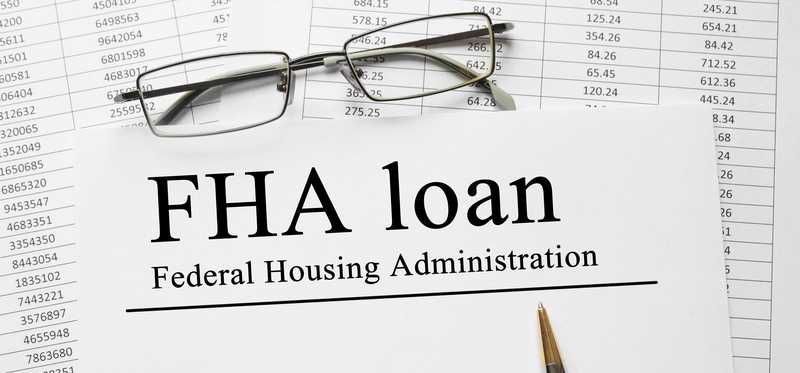15 Real Estate Acronyms Everyone Should Know

15 Real Estate Acronyms Everyone Should Know
Some real estate shorthand that covers the basics
Real estate investing can be a complicated venture, especially if you get lost in the jargon. But since the devil is in the details when it comes to contract terms and language, you need to know what that lingo means before you sign. That's true for homeowners and commercial real estate investors, as well as buyers of real estate-related stocks.
So, to help things along, as is our Foolish way, here's a list of 15 basic acronyms that everyone should know. An acronym comprises the first letters of each word in a term, while an abbreviation is a shortened form of a word, FYI. (See what I did there?)
5 Stocks Under $49
Presented by Motley Fool Stock Advisor
We hear it over and over from investors, "I wish I had bought Amazon or Netflix when they were first recommended by The Motley Fool. I'd be sitting on a gold mine!" It's true, but we think these 5 other stocks are screaming buys. And you can buy them now for less than $49 a share! Click here to learn how you can grab a copy of "5 Growth Stocks Under $49" for FREE for a limited time only.
Previous
Next

1. ABR: accredited buyer representative
Accredited Buyer's Representative (ABR) is a certification the National Association of Realtors (NAR) bestows on agents who undergo specific training for that role.
ABRs work directly with buyers through each stage of the homebuying process -- specifically representing buyers rather than sellers, the latter of which real estate agents must disclose at the beginning of the relationship, which can be easily misunderstood by homebuyers, especially newbies.
Previous
Next

2. APR: annual percentage rate
The annual percentage rate (APR) is the interest rate for a loan or an interest-bearing investment that represents the loan's actual cost. It is different from the annual percentage yield (APY), which includes compounding the interest through the year.
APY is usually higher than APR, so you'll see investment companies emphasize APY, while lenders put the stress on APR.
Previous
Next

3. ARM: adjustable-rate mortgage
An adjustable-rate mortgage (ARM) is one in which the interest rate is adjusted, either up or down, at specific times during the life of the note. They provide borrowers a lower payment than they'd get for the same size loan with a fixed-rate mortgage, but there's also the risk of the rates being higher when that adjustment time comes around.
ALSO READ: 3 Benefits and 1 Big Downside of Adjustable-Rate Mortgages
Previous
Next

4. BIC: broker-in-charge
A real estate broker is someone licensed to own a real estate agency in their state, and an agent is someone licensed to sell property in that state. On top of specific financial duties -- including handling cash flow to agents, escrow accounts, and the like -- a broker-in-charge (BIC) gets the added responsibility of managing and monitoring the behaviors of agents affiliated with the agency.
Previous
Next

5. COO: certificate of occupancy
Rules and regulations vary widely from town to town and county to county, and more, but the certificate of occupancy (COO or sometimes CoO) is something to be aware of in most places. It's the official document you need from local building or zoning departments, certifying a place -- including new construction -- is suitable for occupancy. That's important, obviously.
5 Stocks Under $49
Presented by Motley Fool Stock Advisor
We hear it over and over from investors, "I wish I had bought Amazon or Netflix when they were first recommended by The Motley Fool. I'd be sitting on a gold mine!" It's true, but we think these 5 other stocks are screaming buys. And you can buy them now for less than $49 a share! Click here to learn how you can grab a copy of "5 Growth Stocks Under $49" for FREE for a limited time only.
Previous
Next

6. CPM: certified property manager
Certified Property Manager (CPM) is an NAR-recognized professional designation granted by the Institute of Real Estate Management (IREM) to property managers who meet requirements in more than 30 different functions, including at least three years of experience managing at least 200 units at one to four residential sites of various types.
There's much more, but it should stand to reason that anyone holding a CPM designation should know what they're doing.
ALSO READ: How to Double Your Money Investing in Real Estate in 2022
Previous
Next

7. CRE: commercial real estate
Commercial real estate (CRE) is actually a fairly broad category. Basically, CRE can be pretty much any property not used for residential space. Office, retail, and industrial properties are CRE subcategories, and there are lots of mixed uses of CRE, too. Bottom line: Buyers and owners of CRE expect it to generate a profit, whether through rental income or a capital gain upselling it.
Previous
Next

8. FMV: fair market value
Fair market value (FMV) and, relatedly, fair market rent (FMR) are key measures for real estate buyers to consider whether they're investing or just living in the place. Basically, FMV is what the place is worth on the open market -- based on an agreement between the seller and buyer in each transaction, all totaled up and individually. FMR? Same thing, only with rent instead.
Previous
Next

9. FSBO: for sale by owner
For sale by owner (FSBO) means the seller is going it alone, or at least without a real estate agent, and it typically refers to the residential market. It's such a popular option that it even has its own pronunciation: FIZZ-boe.
While saving the seller and buyer from the agent's commission, it generally entails no access to the Multiple Listing Service and minimal interest from agents who could bring buyers to the table.
How much that matters depends on the seller's interest in guiding the process of completing negotiations, inspections, and all those myriad details that must happen between the contract and the cash.
Previous
Next

10. FHA: Federal Housing Administration
The Federal Housing Administration (FHA) has been around since 1934. Now part of the U.S. Department of Housing & Urban Development (HUD), the FHA provides mortgage insurance on loans made by approved lenders to buyers of single-family and multifamily homes, residential care facilities, and hospitals. Only about 10% of mortgage loans are FHA-insured, but about 83% of those loans are to first-time homebuyers.
5 Stocks Under $49
Presented by Motley Fool Stock Advisor
We hear it over and over from investors, "I wish I had bought Amazon or Netflix when they were first recommended by The Motley Fool. I'd be sitting on a gold mine!" It's true, but we think these 5 other stocks are screaming buys. And you can buy them now for less than $49 a share! Click here to learn how you can grab a copy of "5 Growth Stocks Under $49" for FREE for a limited time only.
Previous
Next

11. GRI: Graduate Realtor Institute
Graduate Realtor Institute (GRI) is a designation the NAR gives to Realtors who have completed at least 90 hours of training. The trade group likens it to the CPA designation accountants can earn to show their advanced understanding of their field.
The NAR also says agents with that designation earn, on average, nearly twice those who do not have it. Apparently, it speaks to their ability to get deals made and consummated. And that should account for something.
Previous
Next

12. HOA: homeowners association
Ah, the homeowners association (HOA): The bane or blessing for condo owners everywhere, depending on owners' perspectives and how well the HOAs actually perform. Of course, it's not just condos. Neighborhoods of all kinds have HOAs. Real estate investors need to be aware of them when prospecting a property.
HOAs vary widely in power -- from being nothing more than a social club to having the legal right to impose and enforce strict rules around repairs, improvements, and even who can live there (e.g., no kids in some seniors' developments). Check those covenants before signing the deed!
ALSO READ: Buying a Home in an HOA? Prepare for This Sneaky Expense
Previous
Next

13. MBS: mortgage-backed securities
Mortgage-backed securities (MBS) are investment instruments backed by a collection of mortgages that are then sold to investment firms or to federal entities like Ginnie Mae and government-sponsored enterprises that are part of the Federal Housing Finance Agency. The interest from all those mortgages is then used to provide income to investors, typically through bonds.
There are many more iterations of all this, and it can get very complicated, but these kinds of securities back trillions of dollars in Americans' home loans. (And a bursting bubble in the subprime part of all this helped cause the Great Recession just over a decade ago.)
Previous
Next

14. NAR: National Association of Realtors
The National Association of Realtors (NAR) is one of the nation's largest and most influential trade groups. Its 1.4 million or so members include real estate agents who have earned the Realtor designation. That's important to keep in mind. Not all agents are Realtors. Earning and keeping that designation includes training and testing and adhering to codes of ethics.
Previous
Next

15. ROI: return on investment
Return on investment (ROI) means just that: how much return you got on the money you invested, in this case, in real estate. It's expressed as a percentage of the cost of the investment itself.
ROI is a pretty simple calculation: ROI = gain minus cost divided by cost.
But that's just the beginning of the math and strategies that employ countless accountants, investment advisors, and fiduciaries of all kinds.
5 Stocks Under $49
Presented by Motley Fool Stock Advisor
We hear it over and over from investors, "I wish I had bought Amazon or Netflix when they were first recommended by The Motley Fool. I'd be sitting on a gold mine!" It's true, but we think these 5 other stocks are screaming buys. And you can buy them now for less than $49 a share! Click here to learn how you can grab a copy of "5 Growth Stocks Under $49" for FREE for a limited time only.
Previous
Next

This short list is a SMART start to REI knowledge
This list is not a complete one by any means. In fact, it barely scratches the surface. But being familiar with these terms will help you understand many of the basics and guide you toward more knowledge as you make your Foolish way into the realm of real estate investing (REI). (See what I did there, again?)
The Motley Fool has a disclosure policy.
Previous
Next
Invest Smarter with The Motley Fool
Join Over Half a Million Premium Members Receiving…
- New Stock Picks Each Month
- Detailed Analysis of Companies
- Model Portfolios
- Live Streaming During Market Hours
- And Much More
READ MORE
HOW THE MOTLEY FOOL CAN HELP YOU
-
Premium Investing Guidance
Market beating stocks from our award-winning service
-
The Daily Upside Newsletter
Investment news and high-quality insights delivered straight to your inbox
-
Get Started Investing
You can do it. Successful investing in just a few steps
-
Win at Retirement
Secrets and strategies for the post-work life you want.
-
Find a Broker
Find the right brokerage account for you.
-
Listen to our Podcasts
Hear our experts take on stocks, the market, and how to invest.
Premium Investing Services
Invest better with The Motley Fool. Get stock recommendations, portfolio guidance, and more from The Motley Fool's premium services.